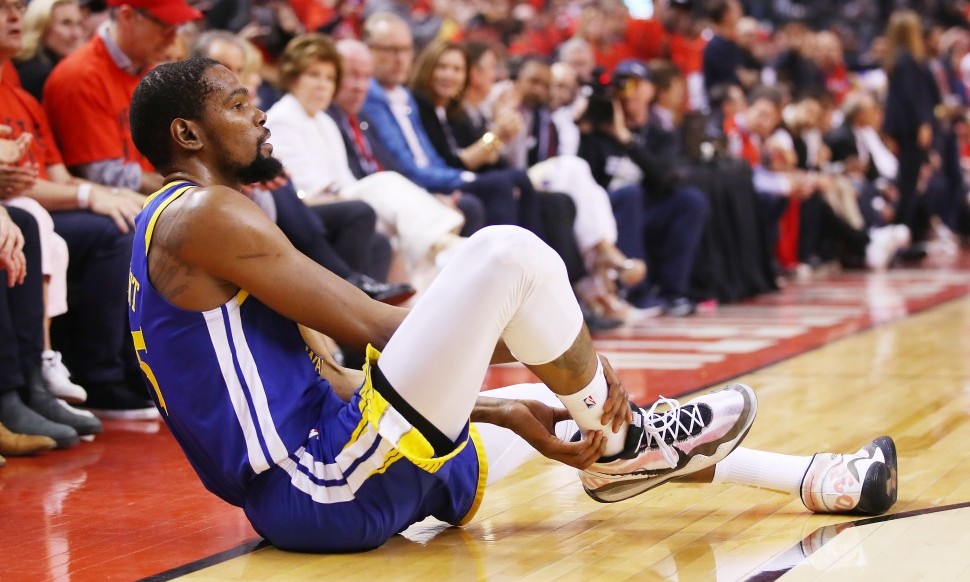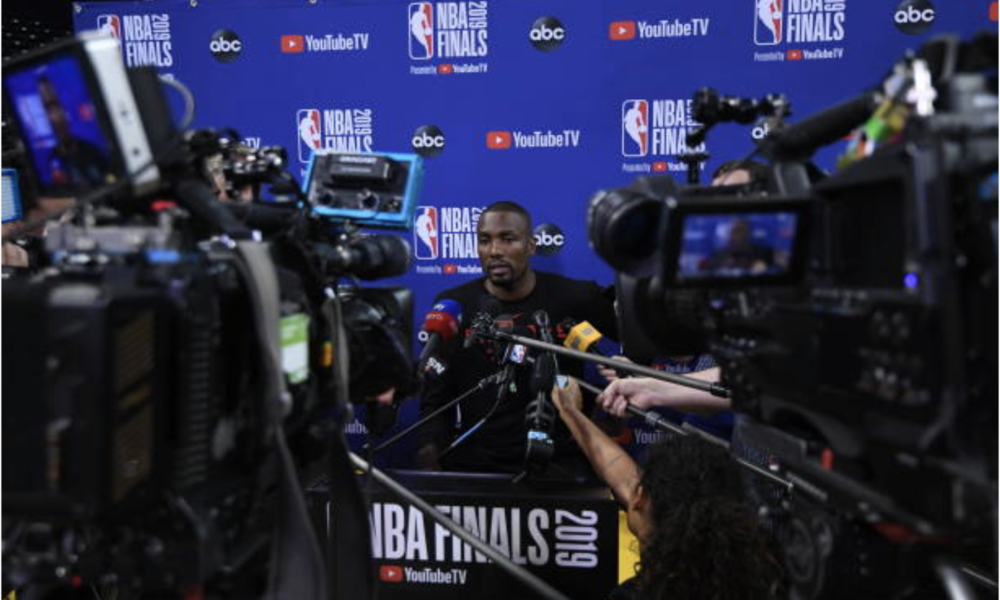In a post-season of fantastical, picture-perfect proportions, Monday night would not have been the ideal game for the Raptors to have won a championship. I want the Raptors to win a championship for more reasons than I can count, including my future job prospects, but one of the big ones is narrative. I want the Raptors to win in a way that is completely and inarguably about them. I want the Raptors to win a championship that redeems and completes, that fills a hole in Toronto that’s been 24 years in the making. I want a Toronto championship to be about Toronto. For four games, this series was about Toronto. The Raptors were as focused as fate, and aside from a few short blips, they were a significantly better team than the Warriors. Injuries or not, the first four games were as Toronto as the CN Tower.
It seemed like Toronto would win the thing easily. And when they did, I wanted the championship to matter. I want it to matter more than anything.
Game five was not about Toronto. Game five was about Kevin Durant’s return, and then Kevin Durant’s injury, and then the fans who cheered the injury, and then Golden State’s responsibility to Durant, and whether he should have been playing in the first place. The cycle revolved around Durant to such an extent that Bob Myers, the Warriors’ president of basketball operations, made the rare choice to speak in front of media after the game.
The game itself was eerie in a way that dispelled the myth of winning over everything. Winning, it turned out, was not everything on Monday night. The Raptors admitted after the game to being rattled by the Durant injury. Kyle Lowry spoke with Steph Curry at halftime about Durant’s health and well-being. Players are part of a small brotherhood, and they understand each others’ lives in a way that media members can never comprehend. Players care tremendously about each other. Competition was set aside, and though the spirit of competition recovered by the fourth quarter, the narrative never did.
After the game, media asked far more questions about Durant’s injury, and responses from fans and media, than about the actual game of basketball. The story was decidedly not about the Toronto Raptors.
The narrative of the finals has entered a place from which it cannot return. The momentum of the finals, the seriousness of the Larry O’Brien trophy, was weighed against Kevin Durant on Monday.
Kevin Durant is one of the most criticized players in the NBA. People have spent years mocking him for his choice to sign with the Golden State Warriors or to respond to criticism on Twitter. Durant sometimes wears his heart on his sleeve, and that draws further derision from countless throngs of basketball fans looking for cheap likes. For people like Durant, being a celebrity can probably be difficult at times.
“He’s one of the most misunderstood people,” said Myers of Durant. “I know Kevin takes a lot of hits sometimes, but he just wants to play basketball and right now he can’t. Basketball has gotten him through his life. So it means, I don’t know that we can all understand how much it means to him.”
It is hypocrisy of the highest order that many of Durant’s most fierce critics were calling for blood in Golden State because the team let him play, whether or not there was a significant risk of re-injury, which is not yet public information. You can’t mock Durant for years and then position yourself as his defender. Durant wears his heart on his sleeve, and he takes it personally that people questioned his commitment to his team. You can’t call him soft one day and then criticize the team for allowing him to play the next day.
And look, I’m already far off topic about the Raptors. The general media narrative about the finals has shifted to Durant, and to his health, and to Toronto’s response to his injury.
On the note of Toronto’s response to Durant’s injury, Toronto wants desperately to win a title. It was a pipe dream for so long that Toronto could even compete, and then the Raptors finally built a pseudo-contender, only to be humbled so many years in a row by LeBron James. It’s surreal, still, that this iteration of the Raptors is even competing for a championship. It finally happened. After 24 years. And with all that destiny in mind, it’s easy to understand why fans – in a primal state during a potential championship-clinching game – could cheer for the idea that Toronto would have an easier path to a win. Perhaps fans were only cheering for the fast-break opportunity, as Kyle Lowry suggested after the game.
Regardless, Toronto cheered when Durant went down. It happened not only inside the stadium, but in Jurassic Park, and in countless bars and watching parties across the city. It is yet another storyline to distract from the Toronto Raptors being one win away from an NBA Championship.
All the overlapping noise, the splintering of focuses, the disparate paths down which our attention has wandered, has posed one question: does winning matter more than anything? For many Raptors players, they answered that question on Monday night. They valued Durant’s health and happiness over winning a game of basketball, no matter how important. They were legitimately concerned about an opponent, even though his presence meant Toronto was less likely to beat the Warriors. For many of the media members criticizing fandom in Toronto, they answered the question as well. They slammed Toronto for seeming to value winning over Kevin Durant’s health. Steph Curry answered the question explicitly and said that some things are bigger than basketball.
“Everybody gets so wrapped up in chasing championships and the greatness that you see on the floor, but life is more important in terms of caring about an individual,” Curry said.
Life is more important.
Curry said explicitly what so many implied in the aftermath of Durant’s injury: winning isn’t everything. After all, a choice requires a proper counterweight to be a real choice. We value players who want to win above all else, who sacrifice their own health in the pursuit of championships. Durant has been lauded for playing. But do we value players, or organizations, who sacrifice others’ health in the pursuit of championships? Golden State is derided in the same breaths as Durant is praised. It’s the same in theology, where a variety of monotheistic religions explain god’s unclear presence through the idea that faith wouldn’t be faith if we knew the creator to exist beyond any doubt. Faith requires choice.
Winning, too, requires choice. Fandom requires choice. Basketball took a human cost on Monday, and a question was posed as a result. For twenty or thirty minutes after Durant fell to the floor, the biggest stage upon which to winning, the most important victory in the known basketball universe, lost a little bit of value.
I doubt the same will be true by the time game six begins. Within our culture, winning, the value of winning, rolls onward like an unstoppable train. Maybe it can be slowed, but it already felt by the end of game five that winning had returned to its traditional seat as the most valued thing in the world. And Toronto remains the favourite, remains likely to win the championship and redeem its basketball past. It could be a beautiful result in the wake of tragedy. But for a few short minutes, the scales seemed to tip as the meaning behind winning an NBA Championship was weighed against Kevin Durant’s health and happiness. I wish that both sides of the scale could win, that both could be true. I hope that Durant can be happy and healthy at the soonest possible occasion. I hope that the Toronto Raptors win an NBA Championship, and I hope it means everything. But most of all, I wish that the two didn’t have to be set in opposition in the first place.



